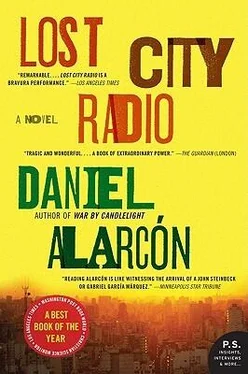Still, the city was becoming accustomed to the idea of peace. She knew by now what his absence meant, but when the war ended, there was euphoria, a sudden and unexpected reason to smile. Norma had expected Rey to come home, sunburned and smiling, haggard perhaps, but alive, shaking his head and telling the tale of another close call searching for medicinal plants at the edge of a war zone. He was a scientist, first and foremost, an ethnobotanist committed to the preservation of disappearing plant species. This is what he told her, and for a time, she believed him. She had always wanted to believe him. When they were newlyweds, she had asked him: what about that night we met, the dancing, the ID? Where did they take you?
“They cured me,” Rey told her. “They took me to the Moon and they fixed me right up. No more,” he said. “I’m not interested in politics. I’m interested in living.”
So he went into the jungle and returned with stories of insects the size of his hand, of dense, verdant valleys and their mysteries, of fluttering birds plumed in electric colors. And then he didn’t return, and Norma waited. Then word filtered around the radio of a battle fought near the town of 1797 in the eastern jungle, of men captured and some killed. The rumors said many were buried and would soon be lost in the impossibly thick forest. They said it had been a slaughter, a victory celebration in the form of mass graves and anonymous dead — what does the end of a war mean if not that one side ran out of men willing to die? Peace was coming, now it was here. The battle near 1797 was ignored. And there were others: the war’s coda, a string of killings in faraway places that were better left alone. In the city, there had been a battle as well, but now it was over; couldn’t the people be forgiven if they noticed the sky for the first time in years, mistook its opaline glaze for sunlight, and began to forget?
There were two kinds of lists in those days, official and unofficial, and each contained different tallies of dead and missing, of exiled and imprisoned. With the right connections, Norma thought, she might be able to see those other lists, the real ones, that grim accounting of the war and its yield. But she never did. The next months passed in a haze, Norma going through the motions of living. She appeared at work, read the news without understanding or even attempting to understand what she was reading. She asked for a break from her Sunday-night show. Her many fans called in, expressing concern: was Norma all right? She had made the rounds at the university, been told in a variety of ways that the IL was not real, that her husband would be coming home, that it was only a matter of time, that he was on a drug binge in the forest, that the stress had finally gotten to him. Many refused to see her at all, citing their busy schedules or family obligations, but she sensed they were afraid of her. She didn’t eat, spent a few nights a week at the station, afraid to go home and confront the empty apartment. When she returned to Lost City Radio, she was dispirited, her honey-voice weary, but the calls came anyway, by the dozens: with the fighting over, people were now asking, with sudden abandon, where their loved ones had wandered off to.
One day, when her condition could no longer be ignored, Elmer suggested they go to the prisons. Rey had been mistaken for an IL sympathizer, Elmer reasoned, which explained his name on the list that had been read on the air. He’d been found lost and wandering through the eastern jungle, and arrested. There, among the various half-dead in prison, she might find him, and, if he were there, strings could be pulled. Elmer was a friend then. He encouraged her. Papers were filed, permits granted, and the station, still currying favor with the newly victorious government, promised a positive report on conditions inside. The war had been over for a year.
Norma and Elmer drove to the prison in the station’s four-by-four, through neighborhoods of haphazard construction, past homes with street numbers scrawled in chalk on the outside walls, past shanties topped with metal sheeting. They presented their papers at various roadblocks, some manned by uniformed soldiers, some by neighborhood thugs, and everything was solved with a few coins and a deferential smile. Children chased the truck as it sped by, waving through the billows of dust. They drove through communities whose essential feature was their color: a burnt, dry shade of yellowish gray, everything bathed in murky sunlight. These were the areas that Norma could just make out from the station on a clear day, where the mountains first appeared and city seemed to end — only it didn’t. It never ended. More people arrived each day as the jungle and the sierra emptied of human life. The capital’s new residents made homes here, in the inhospitable folds of the lower mountains, in the city’s dry and teeming servants’ quarters.
The prison was a sprawling complex, its watchtowers rising high above the surrounding neighborhood in a district known as Collectors. There were crowds of people by the visitors’ door, women selling newspapers, sandwiches, and knickknacks to bribe the guards with: foreign coins, plastic key-chains, old comic books. Norma and Elmer waited in line with restless mothers, with anxious wives and girlfriends. They were all turned away.
Except Norma and Elmer, who passed through the first of a half-dozen locked doors: they stepped into a long corridor to another lock and another young man with a weapon. Each time, they were told to pull up their right sleeves, and the guard stamped their forearms. At the next gate, the guard would count the number of stamps, add his own, and wave them through. Eventually, they were ushered into a spare, windowless room with humming fluorescent light above. There were three metal folding chairs. They sat down to wait.
“Don’t be nervous,” Elmer said after a while. “It’s not so bad. Look at your arm.”
So she pulled back her sleeve once more and inspected the blurred purple markings. There was no state seal or a flag or code of any kind. She smiled. CITY’S BEST OFFICE SUPPLY, VETCHER BROTHERS CANNERY, A–1 WINDOW REPAIR, THE METROPOLE HOTEL, ELEGANCE WITHOUT COMPROMISE. This was her security clearance.
“I expected something more official,” said Norma.
“That’s because you haven’t been here before.”
Then a gruff man in a faded-olive uniform appeared and showed them to his office. He didn’t shake hands, or even look at them, but the name tag on his uniform said ROSQUELLES. He sat down at his desk and announced that no one had informed him of their visit. “How do I even know who you are?” he asked.
They had decided it would be best for Elmer to speak, so as not to offend the official. With a nod to Norma, Elmer pulled some papers from his inside pocket. “We have letters.”
But instead, Rosquelles stared at Norma, his gaze between menacing and dismissive. “Woman,” he said, “why would you want to go in there?”
The office was dank and disordered, crammed with file cabinets that seemed ready to vomit their contents all over the floor. A cheaply framed photograph of a Swedish mountain scene hung askew. This was popular then, a way of idealizing life in the country’s provinces: transforming the lost, war-ravaged hamlets into tidy Scandinavian villages with crystalline streams and quaint windmills, hills covered with bright swaths of green. Norma almost smiled. Our mountains are not like that.
She considered mentioning Rey, explaining that there had been some kind of mistake, but then she thought better of it. “We have approval, sir.”
“That’s not what I asked.”
“I suppose I don’t understand your question then.”
Rosquelles sighed. “Inside we have the killers and the beasts and the assassins that we should have disposed of the moment we found them. These are the people you want to see?”
Читать дальше












